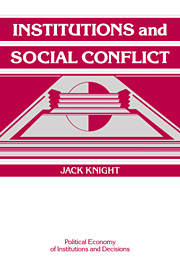Book contents
- Frontmatter
- Contents
- Series editors' preface
- Preface
- CHAPTER 1 INTRODUCTION
- CHAPTER 2 THE PRIMARY IMPORTANCE OF DISTRIBUTIONAL CONFLICT
- CHAPTER 3 INSTITUTIONS AND STRATEGIC CHOICE: INFORMATION, SANCTIONS, AND SOCIAL EXPECTATIONS
- CHAPTER 4 THE SPONTANEOUS EMERGENCE OF SOCIAL INSTITUTIONS: CONTEMPORARY THEORIES OF INSTITUTIONAL CHANGE
- CHAPTER 5 THE SPONTANEOUS EMERGENCE OF SOCIAL INSTITUTIONS: A BARGAINING THEORY OF EMERGENCE AND CHANGE
- CHAPTER 6 STABILITY AND CHANGE: CONFLICTS OVER FORMAL INSTITUTIONS
- CHAPTER 7 CONCLUSION
- Bibliography
- Index
CHAPTER 3 - INSTITUTIONS AND STRATEGIC CHOICE: INFORMATION, SANCTIONS, AND SOCIAL EXPECTATIONS
Published online by Cambridge University Press: 16 September 2009
- Frontmatter
- Contents
- Series editors' preface
- Preface
- CHAPTER 1 INTRODUCTION
- CHAPTER 2 THE PRIMARY IMPORTANCE OF DISTRIBUTIONAL CONFLICT
- CHAPTER 3 INSTITUTIONS AND STRATEGIC CHOICE: INFORMATION, SANCTIONS, AND SOCIAL EXPECTATIONS
- CHAPTER 4 THE SPONTANEOUS EMERGENCE OF SOCIAL INSTITUTIONS: CONTEMPORARY THEORIES OF INSTITUTIONAL CHANGE
- CHAPTER 5 THE SPONTANEOUS EMERGENCE OF SOCIAL INSTITUTIONS: A BARGAINING THEORY OF EMERGENCE AND CHANGE
- CHAPTER 6 STABILITY AND CHANGE: CONFLICTS OVER FORMAL INSTITUTIONS
- CHAPTER 7 CONCLUSION
- Bibliography
- Index
Summary
How do institutions affect the rationality of social actors? Answering this question is a prerequisite for understanding the emergence of social institutions. To see the context in which such an answer can be derived, we need to refer back to the conception of rational decision making sketched in Chapter 1. An individual actor, motivated by a desire to maximize his or her own set of goals, faces one of two possible decision-making environments. In the first, the parametric world, the rational actor calculates his optimal strategy by taking the rest of the environment as a given. This includes the choices of others with whom he interacts, as he assumes that their decisions are fixed and unaffected by his choices. But true parametric choices are generally limited to instances of perfect market competition and are not, I will argue, the relevant environment for most social and political interactions. The dominant environment for social interactions is, rather, that of strategic interdependence.
Note the three forms of interdependence characteristic of strategic interaction: (1) The rewards of each depend on the rewards of all; (2) the rewards of each depend on the choice of all; and (3) the choices of each depend on the choices of all (Elster, 1986: 7).
- Type
- Chapter
- Information
- Institutions and Social Conflict , pp. 48 - 83Publisher: Cambridge University PressPrint publication year: 1992



